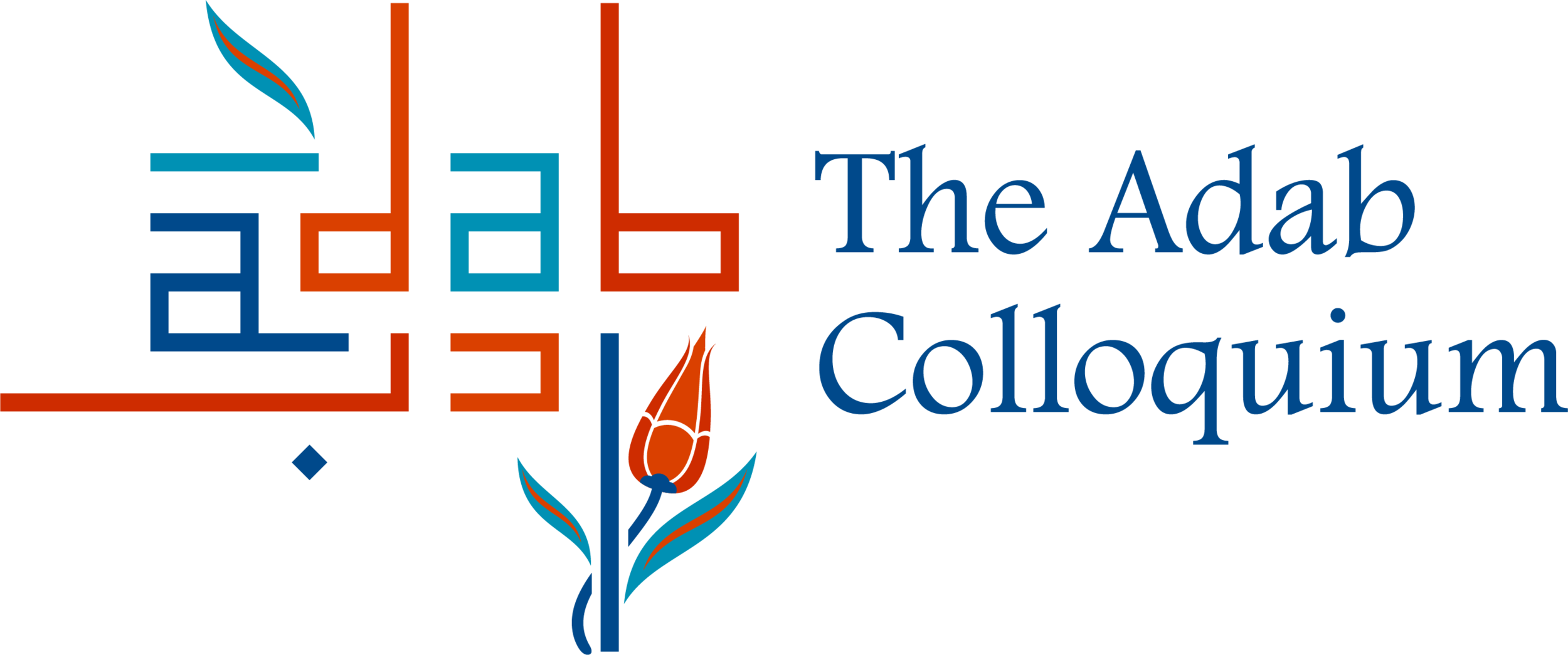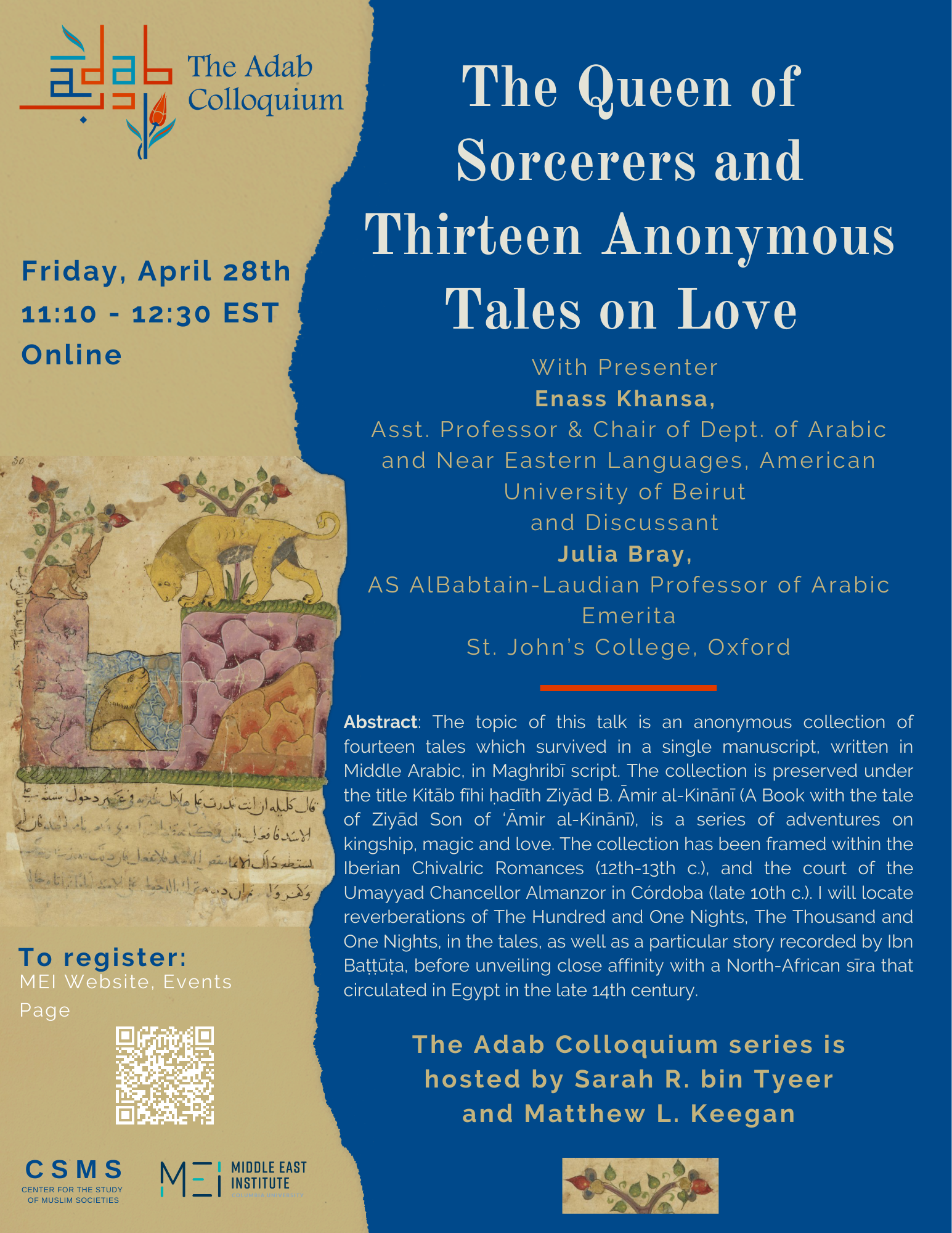
The Adab Colloquium
With Sarah R. bin Tyeer and Matthew L. Keegan

The adab Colloquium brings together scholars of Islamicate languages who study the cross-cultural, transregional phenomenon of adab. The term adab, usually translated as “literature” in the post-colonial world, had a much wider range of ethical and generic connotations in pre-colonial contexts. The division of the world into secular and religious realms and the re-coding of adab as a kind of secular literature have tended to obscure the complex ways in which adab was written, circulated, read, and conceived of in the Islamic world before secularism. The secularization of adab has also led to a reformation of the pre colonial adab canon, which is only now beginning to be understood. The MEI & CSMS-sponsored adab Colloquium at Columbia is a platform for scholars whose work engages with the range of adab practices of reading, writing, and performance from the 6th century down to the 19th century. The colloquium brings together faculty and graduate students from Columbia and other universities in the region for intensive discussions of new research by leading specialists invited from the US and abroad. Scholars will circulate recently published or forthcoming work to be discussed in the colloquium.
There will be four events per semester covering the various topics, languages, and regions of Islamicate adab.
To receive updates and the pre-circulated papers, subscribe to the Workshops & Colloquiums Email List.
Upcoming Adab Colloquia
Past Adab Colloquia
Spring 2023
Fall 2023
Join us on 10/28 for a Book Talk with Professor Suzanne Stetkevych and Dr Huda Fakhreddine.
Join us for the first Adab Colloquium of the semester !
The topic of this talk is an anonymous collection of fourteen tales which survived in a single manuscript, written in Middle Arabic, in Maghribī script.
Join us for a book talk with Bilal Orfali and Maurice A. Pomerantz moderated by Sara bin Tyeer and Matthew Keegan.
Biographical dictionaries often also served as anthologies with—at times—detailed analyses of poetry and literary aesthetics.
Spring 2022
Fall 2022
Adab manifests itself in various ways in the works of Timurid intellectuals. Asil al-din Wâiz presents it as an all-encompassing concept in 1450s. Nawars works from in 1490s suggest that its main function was ensuring the social cohesion. Finally, Käshifi makes it the basis basis of his political philosophy around the 1500s.
September 30th, 12:10pm - 2:00pm
Join us for the Adab Colloquium to discuss this chapter, which explores what little is known about the Arabic typewriter, bringing the divergent origin-stories together.
April 29
Join us for the Adab Colloquium on Friday, April 29th, 11:10am - 1:00pm, to discuss this chapter which explores how genealogical notions of “Arabness” (‘urūbiyyah) structured the process of identity formation and the articulation of cultural memory in Nasrid Granada.
Join us on April 15th for this Adab colloquium with Presenter Helen Pfeifer, University Lecturer in Early Ottoman History, University of Cambridge and Discussant Tunç Şen, Assistant Professor, Columbia University, on “The Art of Conversation in the Ottoman Empire.”
Join us for this Adab colloquium with Presenter Tunç Şen, Columbia University, and Discussant Nir Shafir, University of California San Diego, on “An Emotional Biography of an Insecure Scholar in the Early Modern Ottoman Hierarchy of Learning”.
Join us for this Adab colloquium with Ziad Dallal, Visiting Assistant Professor of Arabic and The Humanities at Bard College, and discussant Matthew Keegan, Moinian Assistant Professor of Asian & Middle Eastern Cultures at Barnard College of Columbia University, on "Desire and the Diseases of Translation: The Metaphorology of Civilization in Alas, I am Not a European.”
Spring 2021
Fall 2021
Join us for this Adab colloquium with Dr. Cyrus Ali Zargar, Distinguished Professor in Islamic Studies at the University of Central Florida, and discussant Dr. Ali Altaf Mian, Assistant Professor of Religion and Izzat Hasan Sheikh Fellow in Islamic Studies at the University of Florida, on "Sober in Mecca, Drunk in Byzantium: Antinomian Space in the Poetry of ʿAṭṭār.”
Join us for this Adab colloquium with Dr. Haifa S. alFaisal, Associate Professor of Comparative Literature at King Saud University and discussant Dr. Boutheina Khaldi, Professor of Arabic and Comparative Literature at the American University of Sharjah on "From Balāgha to ʾIntiqād: Politicising the Science of Literature in Modern Arabic Literary Thought.”
Join us for this Adab colloquium with Oludamini Ogunnaike (University of Virginia) and discussant Mamadou Diouf (Columbia University) on "All Muhammad, All the Time: The Poetic, Prophetic Cosmology and Epistemology of Shaykh Ibrahim Niasse in Three Treatises and Poems”
Join us for this Adab colloquium with Cyrus Ali Zargar (University of Central Florida) and discussant Ali Altaf Mian (University of Florida) on "Sober in Mecca, Drunk in Byzantium: Antinomian Space in the Poetry of ʿAṭṭār."
Join us for this Adab colloquium with Presenter Domenico Ingenito (UCLA) and Discussant Sayeh Meisami (University of Dayton) on Beholding Beauty: Saʿdi of Shiraz and the Aesthetics of Desire in Medieval Persian Poetry (Brill, 2020)
Join us for the February Adab Colloquium with Presenter Maryam Wasif Khan (LUMS University, Lahore) and Discussant Jennifer Dubrow (University of Washington, Seattle) on the Martyr/Mujahid: Muslim Origins and the Modern Urdu Novel.
Join us for the first Adab Colloquium of 2021. With Presenter Murat Umut Inan, (Social Sciences University, Ankara) and Discussant Oscar Aguirre-Mandujano, (University of Pennsylvania) on the Süruri’s Bahrü’l-Ma‘arif: Conceptions and Discussions of Poetry in the Early Modern Ottoman World.
Fall 2020
Join us for the Adab Colloquium with Presenter Hany Rashwan, University of Birmingham and Discussant Stefan Sperl, School of Oriental and African Studies (SOAS)
Join us for the Adab Colloquium with Presenter Sara Hakeem Grewal (MacEwan University) and Discussant Purnima Dhavan (University of Washington).
Join us October 28th to hear Lara Harb discuss her new book, Arabic Poetics: Aesthetic Experience in Classical Arabic Literature (Cambridge: Cambridge University Press, 2020). Focusing on Chapter One of her book, entitled “Wonder: A New Paradigm,”
The Imprint of the Era in the Adab of the Times: Circulation and the Persianate at Empire’s End with Presenter Mana Kia, Columbia University and Discussant Sunil Sharma, Boston University. In this Adab Colloquium, Dr Mana Kia will discuss her paper examining the relation between material circulation of texts, commemorations of collectives, and transregional social imaginaries at the end of Persianate empires between Iran and India.






















